 W
WAlbert was the King of Saxony and a member of the House of Wettin.
 W
WArchduke Albrecht Friedrich Rudolf Dominik of Austria, Duke of Teschen, was an Austrian Habsburg general. He was the grandson of Emperor Leopold II and one of the chief military advisors of Emperor Francis Joseph I. As Inspector General for 36 years, he was an old-fashioned bureaucrat who largely controlled the Austro-Hungarian Army and delayed modernization. He was honored with the rank of Field Marshal in the armies of Austria-Hungary (1863) and Germany (1893).
 W
WAlbrecht, Duke of Württemberg was the last Württemberger crown prince, a German military commander of the First World War, and the head of the House of Württemberg from 1921 to his death.
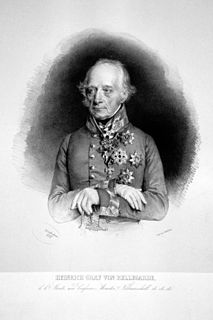 W
WCount Heinrich von Bellegarde, Viceroy of Lombardy-Venetia, of a noble Savoyard family, was born in Saxony, joined the Saxon army and later entered Habsburg military service, where he became a general officer serving in the Habsburg border wars, the French Revolutionary Wars and the Napoleonic Wars. He became a Generalfeldmarschall and statesman.
 W
WOtto Ernst Vinzent Leo von Below served as a Prussian general officer in the Imperial German Army during the First World War (1914-1918). He arguably became most notable for his command, along with the Austro-Hungarian commander Svetozar Borojević, during the victorious Battle of Caporetto in October-November 1917.
 W
WLouis-Alexandre Berthier, 1st Prince of Wagram, Sovereign Prince of Neuchâtel, was a Marshal of the Empire doubling as Minister of War and chief of staff to Napoleon. Born into a military family, he served in the French Army and survived suspicion of monarchism during the Reign of Terror before a rapid rise in the ranks during the French Revolutionary Wars. Although a key supporter of the coup against the Directory that gave Napoleon supreme power, and present for his greatest victories, Berthier strongly opposed the progressive stretching of lines of communication during the Russian campaign. Allowed to retire by the restored Bourbon regime, he died of unnatural causes shortly before the Battle of Waterloo. Berthier's reputation as a superb operational organiser remains strong among current historians.
 W
WFelix Ludwig Graf von Bothmer was a German general from Bavaria, notably during the Brusilov offensive of 1916.
 W
WCharles I or Karl I was Emperor of Austria, King of Hungary, King of Croatia, King of Bohemia, and the last of the monarchs belonging to the House of Habsburg-Lorraine to rule over Austria-Hungary. The son of Archduke Otto of Austria and Princess Maria Josepha of Saxony, Charles became heir presumptive of Emperor Franz Joseph after his uncle Archduke Franz Ferdinand of Austria was assassinated in 1914. In 1911, he married Princess Zita of Bourbon-Parma.
 W
WFranz Xaver Josef Conrad von Hötzendorf, sometimes anglicised as Hoetzendorf, was an Austrian general who played a central role in World War I. He served as K.u.k. Feldmarschall and Chief of the General Staff of the military of the Austro-Hungarian Army and Navy from 1906 to 1917. He was in charge during the July Crisis of 1914 that caused World War I. For years he had repeatedly called for preemptive war against Serbia to rescue the multiethnic Habsburg Empire, which was, he believed, nearing disintegration. Later on, he came to believe that the Dual Monarchy had taken action at the eleventh hour. The Army was also unprepared and he had resorted to politics to further his goals. He was unaware that Germany would relocate the majority of his forces to the East, rather than in the Balkans. Conrad was anxious about invading Russia and when the Tsar's armies had captured the Carpathian mountain passes and were on the verge of invading Hungary, Italy entered the war on the side of the Allies. Nevertheless, the Austro-Germans cleared Galicia and Poland during the Gorlice–Tarnów Offensive in the summer of 1915 and later conquered Serbia in October. From 1915 his troops were increasingly reliant on German support and command. Without support from its German allies the Austro-Hungarian Army was an exhausted force. In March 1917, Charles I of Austria dismissed him as Chief of Staff after Emperor Franz Joseph died and Conrad's Trentino Offensive had failed to achieve its objective; he then commanded an army group on the Italian Front until he retired in the summer of 1918. He died in 1925.
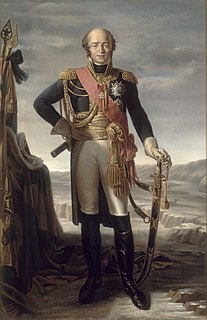 W
WLouis-Nicolas d'Avout, better known as Davout, 1st Duke of Auerstaedt, 1st Prince of Eckmühl, was a French military commander and Marshal of the Empire who served during both the French Revolutionary Wars and the Napoleonic Wars. His talent for war, along with his reputation as a stern disciplinarian, earned him the nickname "The Iron Marshal". He is ranked along with Marshals André Masséna and Jean Lannes as one of Napoleon's finest commanders. His loyalty and obedience to Napoleon were absolute. During his lifetime, Davout's name was commonly spelled Davoust - this spelling appears on the Arc de Triomphe and in much of the correspondence between Napoleon and his generals.
 W
WBernhard Erasmus von Deroy from the Electorate of the Palatinate became a noted general officer in the army of Bavaria. His military career began shortly after the start of the Seven Years' War. During the French Revolutionary Wars he first served on the side of the Coalition against the French revolutionaries, then fought as an ally of the First French Empire during the Napoleonic Wars. Deroy and his colleague, Karl Philipp von Wrede, were dominant personalities in the Bavarian military during the era of Napoleon Bonaparte.
 W
WArchduke Eugen Ferdinand Pius Bernhard Felix Maria of Austria-Teschen was an Archduke of Austria and a Prince of Hungary and Bohemia. He was the last Grand Master of the Teutonic Knights from the Habsburg dynasty.
 W
WGeneral Erich Georg Sebastian Anton von Falkenhayn was the second Chief of the German General Staff of the First World War from September 1914 until 29 August 1916. He was removed on 29 August 1916 after the failure at the Battle of Verdun, the opening of the Battle of the Somme, the Brusilov Offensive and the entry of Romania into the war on the Allied side undid his strategy to end the war before 1917. He was later given important field commands in Romania and Syria. His reputation as a war leader was attacked in Germany during and after the war, especially by the faction which supported Paul von Hindenburg. Falkenhayn held that Germany could not win the war by a decisive battle but would have to reach a compromise peace; his enemies said he lacked the resolve necessary to win a decisive victory. Falkenhayn's relations with the Chancellor Theobald von Bethmann-Hollweg were troubled and undercut Falkenhayn's plans.
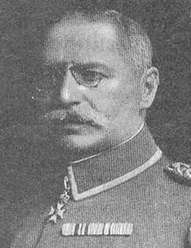 W
WKarl Ritter von Fasbender was a Bavarian General der Infanterie who served as a corps commander throughout World War I and briefly commanded an army at the end of the war.
 W
WFerdinand , born Ferdinand Maximilian Karl Leopold Maria of Saxe-Coburg and Gotha, was the second monarch of the Third Bulgarian State, firstly as ruling prince (knyaz) from 1887 to 1908, and later as king (tsar) from 1908 until his abdication in 1918. Under his rule Bulgaria entered the First World War on the side of the Central Powers in 1915.
 W
WFranz Joseph I or Francis Joseph I was Emperor of Austria, King of Hungary, Croatia, and Bohemia, and monarch of other states of the Austro-Hungarian Empire, from 2 December 1848 until his death. From 1 May 1850 to 24 August 1866 he was also President of the German Confederation. He was the longest-reigning ruler of Austria and Hungary, as well as the sixth-longest-reigning monarch of any country in history.
 W
WFrederick Augustus III, and a member of the House of Wettin, was the last King of Saxony (1904–1918). Born in Dresden, Frederick Augustus was the eldest son of King George of Saxony and his wife, Maria Anna of Portugal.
 W
WFrederick Francis II was a Prussian officer and Grand Duke of Mecklenburg-Schwerin from 7 March 1842 until 15 April 1883.
 W
WFrederick III was German Emperor and King of Prussia between March and June 1888, during the Year of the Three Emperors. Known informally as "Fritz", he was the only son of Emperor Wilhelm I and was raised in his family's tradition of military service. Although celebrated as a young man for his leadership and successes during the Second Schleswig, Austro-Prussian and Franco-Prussian wars, he nevertheless professed a hatred of warfare and was praised by friends and enemies alike for his humane conduct. Following the unification of Germany in 1871 his father, then King of Prussia, became the German Emperor. Upon Wilhelm's death at the age of ninety on 9 March 1888, the thrones passed to Frederick, who had by then been German Crown Prince for seventeen years and Crown Prince of Prussia for twenty-seven years. Frederick was suffering from cancer of the larynx when he died, aged fifty-six, following unsuccessful medical treatments for his condition.
 W
WPrince Friedrich Karl Nikolaus of Prussia was the son of Prince Charles of Prussia (1801–1883) and his wife, Princess Marie of Saxe-Weimar-Eisenach (1808–1877). Prince Friedrich Karl was a grandson of King Frederick William III of Prussia and a nephew of Frederick William IV and William I. He was born in Berlin at the Royal Palace.
 W
WArchduke Friedrich, Duke of Teschen was a member of the House of Habsburg and the supreme commander of the Austro-Hungarian Army during World War I.
 W
WAugust Wilhelm Antonius Graf Neidhardt von Gneisenau was a Prussian field marshal. He was a prominent figure in the reform of the Prussian military and the War of Liberation.
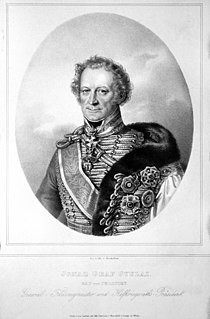 W
WCount Ignác Gyulay de Marosnémeti et Nádaska, Ignácz Gyulay, Ignaz Gyulai was a Hungarian military officer, joined the army of Habsburg Monarchy, fought against Ottoman Turkey, and became a general officer during the French Revolutionary Wars. From 1806 he held the title of Ban of Croatia. In the struggle against the First French Empire during Napoleonic Wars, he commanded army corps. At the time of his death, he presided over the Hofkriegsrat, the Austrian Council of War.
 W
WJakob Freiherr von Hartmann was a Bavarian general who served in the Austro-Prussian War and Franco-Prussian War.
 W
WJulius Jakob Freiherr von Haynau was an Austrian general who suppressed insurrectionary movements in Italy and Hungary in 1848 and later. While a hugely effective military leader, he also gained renown as an aggressive and ruthless commander. His soldiers called him the "Habsburg Tiger"; those opponents who suffered from his brutality called him the "Hyena of Brescia" and the "Hangman of Arad".
 W
WPrince Heinrich XV of Reuss-Plauen, Viceroy of Lombardy-Venetia was the fourth of six sons born into the reigning family of the Principality of Reuss. At the age of fifteen he joined the army of the Habsburg Monarchy and later fought against Ottoman Turkey. During the French Revolutionary Wars he became a general officer and saw extensive service. He commanded a corps during the Napoleonic Wars. From 1801 until his death, he was Proprietor (Inhaber) of an Austrian infantry regiment.
 W
WPaul Ludwig Hans Anton von Beneckendorff und von Hindenburg, was a German general and statesman who led the Imperial German Army during World War I and later became President of Germany from 1925 until his death in 1934. During his presidency, he played a key role in the Nazi seizure of power in January 1933 when, under pressure from advisers, he appointed Adolf Hitler as Chancellor of Germany.
 W
WKarl Philipp, Fürst zu Schwarzenberg was an Austrian field marshal. He fought in the Battle of Wagram (1809) but the Austrians lost decisively against Napoleon. He had to fight for Napoleon in the Battle of Gorodechno (1812) against the Russians and won. He defeated Napoleon decisively in the Battle of Leipzig (1813). He joined the Battle of Paris (1814) that forced Napoleon to abdicate.
 W
WKarl Friedrich von dem Knesebeck was a Prussian field marshal and military adviser in the Napoleonic Wars, best known for designing the campaign plan of the Battle of the Nations and the subsequent invasion of France. As aide-de-camp to the king from 1813, and thereby his closest military advisor, he was a key figure in Prussia's military policy throughout the War of the Sixth Coalition and the subsequent Congress of Vienna.
 W
WKonstantin Pavlovich was a grand duke of Russia and the second son of Emperor Paul I and Sophie Dorothea of Württemberg. He was the heir-presumptive for most of his elder brother Alexander I's reign, but had secretly renounced his claim to the throne in 1823. For 25 days after the death of Alexander I, from 19 November (O.S.)/1 December 1825 to 14 December (O.S.)/26 December 1825 he was known as His Imperial Majesty Konstantin I Emperor and Sovereign of Russia, although he never reigned and never acceded to the throne. His younger brother Nicholas became Tsar in 1825. The succession controversy became the pretext of the Decembrist revolt.
 W
WKonrad Krafft von Dellmensingen was a Bavarian Army general in World War I. He served as Chief of the General Staff of the Royal Bavarian Army before World War I and commanded the elite Alpenkorps, the Imperial German Army's mountain division formed in 1915.
 W
WLeopold Maximilian Joseph Maria Arnulf, Prinz von Bayern was born in Munich, the son of Prince Regent Luitpold of Bavaria (1821–1912) and his wife Archduchess Augusta of Austria (1825–1864). He was a Field Marshal (Generalfeldmarschall) who commanded German and Austro-Hungarian forces on the Eastern Front in World War I.
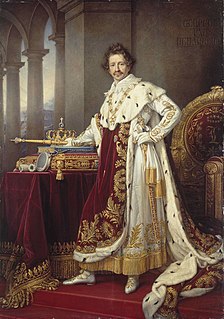 W
WLudwig I or Louis I was king of Bavaria from 1825 until the 1848 revolutions in the German states.
 W
WLudwig III was the last king of Bavaria, reigning from 1913 to 1918. Initially he served in the Bavarian military as a lieutenant and going on to hold the rank of Oberleutnant during the Austro-Prussian War. He entered politics at the age of 18 becoming a member of the Bavarian Legislature and keen participant in politics, endorsing agricultural and voting reforms. Later in life he served as regent and de facto head of state from 1912 to 1913, ruling for his cousin, Otto. After the Bavarian parliament passed a law allowing him to do so, Ludwig deposed Otto and assumed the throne himself. He led Bavaria into World War I, and lost his throne along with the other rulers of the German states at the end of the war.
 W
WAnton Ludwig Friedrich August Mackensen was a German field marshal. He commanded successfully during the First World War of 1914–1918 and became one of the German Empire's most prominent and competent military leaders. After the armistice of November 1918 the victorious Allies interned Mackensen in Serbia for a year. He retired from the army in 1920; in 1933 Hermann Göring made him a Prussian state councillor. During the Nazi era (1933–1945), Mackensen remained a committed monarchist and sometimes appeared at official functions in his First World War uniform. Senior NSDAP members suspected him of disloyalty to the Third Reich, but nothing was proven against him.
 W
WEdwin Karl Rochus Freiherr von Manteuffel was a Prussian Generalfeldmarschall noted for his victories in the Franco-Prussian War.
 W
WHelmuth Karl Bernhard Graf von Moltke was a Prussian field marshal. The chief of staff of the Prussian Army for thirty years, he is regarded as the creator of a new, more modern method of directing armies in the field. He commanded troops in Europe and the Middle East, commanding during the Second Schleswig War, Austro-Prussian War and the Franco-Prussian War. He is described as embodying "Prussian military organization and tactical genius." He was fascinated with railways and pioneered their military usage. He is often referred to as Moltke the Elder to distinguish him from his nephew Helmuth Johann Ludwig von Moltke, who commanded the German Army at the outbreak of World War I.
 W
WNicolas Charles Oudinot, 1st Count Oudinot, 1st Duke of Reggio, was a Marshal of the Empire. He is known to have been wounded 34 times in battle, being hit by artillery shells, sabers, and at least twelve bullets over the course of his military career. Oudinot is one of the Names inscribed under the Arc de Triomphe, Eastern pillar Columns 13, 14.
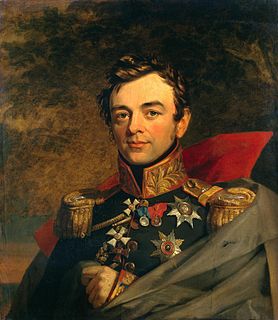 W
WCount Ivan Fyodorovich Paskevich-Yerevansky, Serene Prince of Warsaw was an Imperial Russian military leader. For his victories, he was made Count of Yerevan in 1828 and Namestnik of the Kingdom of Poland in 1831. He attained the rank of field marshal in the Russian army, and later in the Prussian and Austrian armies.
 W
WJohann Josef Wenzel Anton Franz Karl, Graf Radetzky von Radetz was a Bohemian nobleman and Austrian field marshal. He served as chief of the general staff in the Habsburg Monarchy during the later period of the Napoleonic Wars and afterwards began military reforms. A disciplined and fair man, he was so beloved by his troops that he was known as Vater ('Father') Radetzky. He is best known for the victories at the Battles of Custoza and Novara during the First Italian War of Independence.
 W
WRupprecht, Crown Prince of Bavaria, Duke of Bavaria, Franconia and in Swabia, Count Palatine by (the) Rhine, was the last heir apparent to the Bavarian throne. During the first half of the First World War he commanded the 6th Army on the Western Front. From August 1916, he commanded Army Group Rupprecht of Bavaria, which occupied the sector of the front opposite the British Expeditionary Force.
 W
WCarl Friedrich Heinrich Reinhard Scheer was an Admiral in the Imperial German Navy. Scheer joined the navy in 1879 as an officer cadet and progressed through the ranks, commanding cruisers and battleships, as well as senior staff positions on land. At the outbreak of World War I, Scheer was the commander of the II Battle Squadron of the High Seas Fleet. He then took command of the III Battle Squadron, which consisted of the newest and most powerful battleships in the navy. In January 1916, he was promoted to Admiral and given control of the High Seas Fleet. Scheer led the German fleet at the Battle of Jutland on 31 May – 1 June 1916, one of the largest naval battles in history.
 W
WFriedrich Bertram Sixt von Armin was a German general who participated in the Franco-Prussian War and the First World War. In the latter he participated in many battles on the Western Front, including the Battles of Passchendaele and the Lys.
 W
WLudwig Samson Heinrich Arthur Freiherr von und zu der Tann-Rathsamhausen was a Bavarian general.
 W
WJohann Nepomuk Joseph Florian, Graf von Triva was a Bavarian General der Artillerie. He was the first War Minister of the Bavarian kingdom.
 W
WArthur Wellesley, 1st Duke of Wellington, was an Anglo-Irish soldier and Tory statesman who was one of the leading military and political figures of 19th-century Britain, serving twice as prime minister. He is one of the commanders who won and ended the Napoleonic Wars when the coalition defeated Napoleon at the Battle of Waterloo in 1815.
 W
WWilhelm II, anglicised as William II, was the last German Emperor (Kaiser) and King of Prussia, reigning from 15 June 1888 until his abdication on 9 November 1918. Despite strengthening the German Empire's position as a great power by building a blue-water navy and promoting scientific innovation, his tactless public statements and erratic foreign policy greatly antagonized the international community and are considered by many to be one of the underlying causes for World War I. When the German war effort collapsed after a series of crushing defeats on the Western Front in 1918, he was forced to abdicate, thereby bringing an end to the House of Hohenzollern's three-hundred-year reign.
 W
WWilhelm, German Crown Prince, Crown Prince of Prussia was the eldest child and heir of the last German Emperor, Wilhelm II, and the last Crown Prince of the German Empire and the Kingdom of Prussia. After the death of his grandfather Emperor Frederick III, Wilhelm became crown prince at the age of six, retaining that title for more than 30 years until the fall of the empire on 9 November 1918. During World War I, he commanded the 5th Army from 1914 to 1916 and was commander of the Army Group German Crown Prince for the remainder of the war. Wilhelm became head of the House of Hohenzollern on 4 June 1941 following the death of his father and held the position until his own death on 20 July 1951.
 W
WWilliam I or Wilhelm I was King of Prussia from 2 January 1861 and German Emperor from 18 January 1871 until his death in 1888. A member of the House of Hohenzollern, he was the first head of state of a united Germany. He was de facto head of state of Prussia from 1858, when he became regent for his brother Frederick William IV, and he became king when his brother died three years later.
 W
WWilliam II was the last King of Württemberg. He ruled from 6 October 1891 until the dissolution of the kingdom on 30 November 1918. He was also the last German ruler to abdicate in the wake of the November Revolution of 1918.
 W
WKarl Philipp Josef, Prince von Wrede was a Bavarian field marshal. He was an ally of Napoleonic France until he negotiated the Treaty of Ried with Austria in 1813. Thereafter Bavaria joined the coalition.